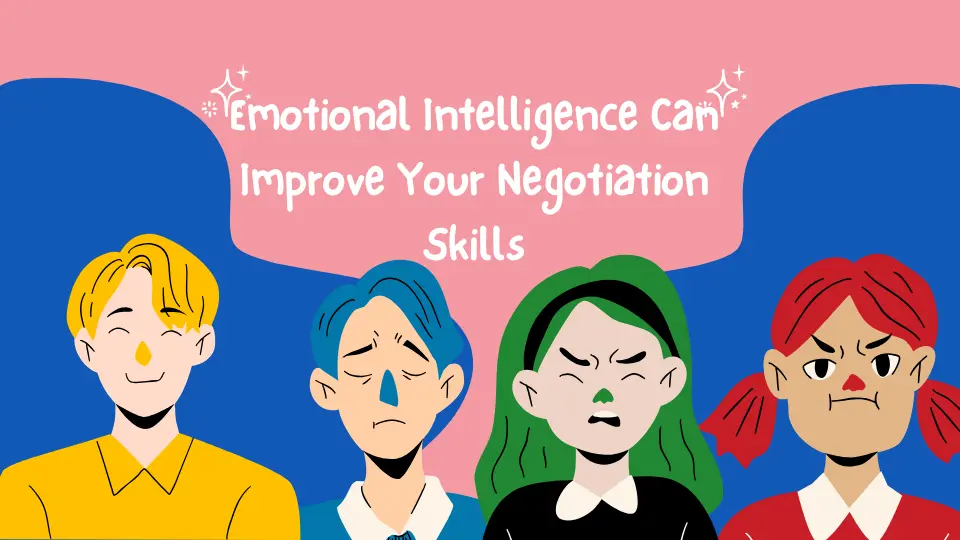Negotiation. It’s a skill we all need, whether we’re haggling over the price of a used car or negotiating our salary at work. But what sets the best negotiators apart? Is it confidence? Experience? Sure, those help, but there’s something even more powerful that can make or break a deal: emotional intelligence (or EI). In this post, we’re diving into how emotional intelligence can improve your negotiation skills and make you a stronger, more empathetic negotiator.
What is Emotional Intelligence?
Before we dive into how EI impacts negotiation, let’s make sure we’re on the same page. Emotional intelligence is the ability to recognize, understand, manage, and use emotions in positive ways. It’s not just about managing your own emotions, though – it’s also about understanding and responding to the emotions of others. When you can read the room, stay calm under pressure, and make others feel heard, you’re already using emotional intelligence.
Why Emotional Intelligence Matters in Negotiation
Negotiation is as much about psychology as it is about logistics. It’s about knowing what the other person wants, what they’re feeling, and why they’re motivated to say yes or no. A good negotiator doesn’t just look at the facts on paper; they consider the emotions, needs, and desires at play in any given conversation.
When you bring emotional intelligence into the negotiation process, you gain an advantage in several key ways:
- Building Trust
Trust is crucial in any negotiation. If the other party feels you’re being genuine and listening to their concerns, they’re more likely to be open and honest with you. Emotional intelligence helps you build this trust by making it easier to understand their perspectives, empathize with their feelings, and respond thoughtfully. - Managing Stress and Staying Calm
Negotiations can get heated. If you’re prone to stress, it can cloud your judgment and make you react impulsively. Emotional intelligence helps you stay grounded, even when things get tense. This ability to keep cool under pressure can prevent small conflicts from escalating and keeps the negotiation on track. - Reading Body Language and Tone
People don’t always say what they mean, but their body language and tone often reveal how they really feel. A high EI enables you to pick up on these non-verbal cues, which can be especially valuable in understanding the true intentions of the other party. Are they anxious? Excited? Reluctant? Recognizing these subtle signals can help you adjust your strategy on the fly.
How to Use Emotional Intelligence to Improve Your Negotiation Skills
Let’s break down some actionable ways to use emotional intelligence during a negotiation.
- Self-Awareness: Know Yourself First
Self-awareness is at the core of emotional intelligence. Before stepping into a negotiation, take a moment to check in with yourself. What’s your emotional state? Are you feeling stressed, frustrated, or overly eager? Being aware of your own emotions will help you manage them so they don’t cloud your judgment. Remember, self-awareness allows you to stay in control.
- Empathy: Put Yourself in Their Shoes
Empathy is one of the greatest influential tools in cooperation. By genuinely trying to understand the other person’s perspective, you create a bridge of understanding. Attend prudently to what they’re proverb, and try to recited among the outlines. What do they really want? What concerns might they have that they’re not openly expressing?
- Practice Active Listening
Active listening is about more than just nodding along while the other person talks. It’s around fully attractive with pardon they’re proverb and responding considerately. When you actively listen, you show respect for their perspective, which can make them more willing to compromise.
Tip: Make eye contact, nod occasionally, and summarize what they’ve said to show you’re engaged. For example, say, “So what I’m hearing is that your main concern is…” This can go a long way in making the other party feel understood.
- Manage Your Emotions (and Theirs)
In any negotiation, emotions can run high. A key part of emotional intelligence is managing your own emotions so you don’t let them take over. But it’s also about managing the emotions of the other party. If you sense frustration, take a step back and defuse the tension before continuing.
Example: If things start to get tense, consider taking a short break. A quick pause can give everyone a moment to cool down and regroup, leading to a more productive conversation.
Final Thoughts
Emotional intelligence isn’t just a “soft skill”; it’s a crucial element that can transform the way you negotiate. By practicing self-awareness, empathy, and active listening, you can better understand the needs and feelings of others, which can lead to more positive outcomes in negotiations. Whether you’re closing a business deal or discussing a project with a team member, harnessing the power of emotional intelligence will make you a more effective and respected negotiator.
So, next time you’re entering a negotiation, remember to tap into your emotional intelligence. It might just be the secret weapon you’ve been missing.

